TIBET MAKES CONTACT: China makes demands
At a December 4 news conference held in Dharamsala, India, the Dalai Lama announced that contact between Beijing and the Tibetan government-in-exile has been reestablished. The Dalai Lama told the assembled audience that his brother, Gyalo Thondup, made a secret visit to China in late October and returned with hopes for a more substantial dialogue. Formal contact between the Dalai Lama and Beijing, through the Chinese embassy in New Delhi, was cut in 1993. Informal links were maintained until severed altogether by Beijing in November of 1998. Asked if this most recent development might hold promise for a change in Chinese policy toward Tibet, the 65-year-old Tibetan leader said, “It is too early to say. What is essential is not whether we find agreement or not . . . but that we meet person to person.”
After initially denying reports of Thondup’s visit, Beijing authorities confirmed on December 7 that “channels of contact have been opened.” Chinese Foreign Ministry spokeswoman Zhang Qiyue insisted, however, that any future talks would take place only if the Dalai Lama accepted long-standing Chinese principles. “[He] must give up advocating Tibetan independence, stop activities aimed at splitting China, and openly declare that Tibet is an inalienable part of Chinese territory,” Zhang told a news conference. As for whether or not Thondup’s visit might signal a change in China’s approach to the Tibet problem, the Tibetan Information Network suggested: “Events of the past two decades suggest that the recent initiatives may be merely a well-timed attempt by China to consolidate its position internationally and to give an appearance of a �softening’ or greater openness on the Tibet issue.”
Bubba brings Buddhist Crackdown
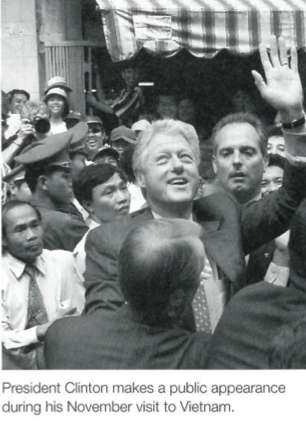
President Clinton’s visit to Vietnam on November 16�19 precipitated a crackdown on dissident religious groups by the Vietnamese government. Police targeted groups that are not included in the six state-sanctioned religious organizations. Thich Quang Do, head of the Unified Buddhist Church of Vietnam, human rights advocate, and onetime nominee for the Nobel Peace Prize, was detained and asked to leave the An Giang province in early October. Do was questioned and released after he and a small group of followers attempted to bring relief supplies to the victims of severe flooding in the Mekong delta. Government officials explained that all relief supplies must go through a government agency. Do later commented on Clinton’s visit, expressing concerns that his appearances would be used to promote government policies.
In Ho Chi Minh City, Vietnamese police seized documents from members of the Thanh Hai Vo Thuong Su sect, a Taiwan-based religious group founded in 1989. A government report characterized the documents as “anti-socialist.” The crackdown came only days before President Clinton’s visit. The raid was first reported in the Thanh Nien (“Young People”) newspaper.
Ha Hai, head of the Hao Hao Buddhist Church, was arrested and detained while enroute to Ho Chi Minh City during President Clinton’s visit. The Vietnamese government claimed that Mr. Hai intended to cause “social disorder” and that the arrest was a preventative step. Following Hai’s arrest the sect’s U.S. office claimed that sect members, including Hai’s sons, had been beaten in An Giang province when they protested Hai’s incarceration. The Hao Hao Buddhist Church broke from the state-sanctioned Hao Hao Buddhist organization and is now outlawed in Vietnam.
CANDID CAMERA
Several recent scandals have shaken the Thai religious establishment. In two incidents this fall, Thai monks were caught breaking their monastic vows.
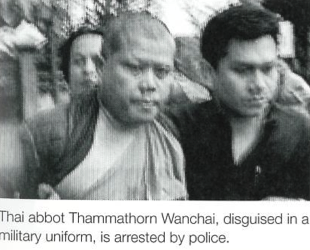
In October, Thammathorn Wanchai, an abbot of a provincial monastery in central Thailand, was caught entertaining two unnamed women at a “secret residence.” Stalked and filmed by a camera crew from the ITV television network, Wanchai was arrested as he tried to leave the residence disguised in a military uniform. He was later defrocked by his order when alcohol, pornography, condoms, and women’s underwear were found inside. He faces criminal charges for impersonating an army officer.
The incident follows on the heels of another scandal earlier in the month in which two Thai monks were observed singing and drinking alcohol at a karaoke bar. Phra Pativetviset, a senior Bangkok abbot – described as a “party animal” by several bar maids – and several companions donned wigs and sunglasses in order to clandestinely drink and sing the night away at a rural night spot north of the city. Pativetviset later resigned from his order.
Even before these most recent controversies, Thai monks were placed under the jurisdiction of the Religious Affairs Department, which actively investigates accusations of transgressions among members of monastic communities, as a result of scandals in recent years that include rape, murder, and drug trafficking.
SAVE THE SUTRAS
The Tibetan Buddhist Resources Center (TBRC), a nonpolitical and nonsectarian organization dedicated to the preservation of Tibetan literary heritage, has been quietly assembling one of the most comprehensive and diverse libraries of Tibetan texts in the world. According to Gene Smith, Executive Director of the TBRC, the simple purpose of the center is “to just save the content . . . Regardless of whether or not Tibet becomes independent, and that possibility seems less and less likely, our job is to save the content and to return to Tibetans, wherever they are, what has been preserved in the West.” To that end, the TBRC has been actively acquiring Tibetan texts from India, China, Nepal, Bhutan, and elsewhere. Smith himself is widely respected in the field of Tibetan Studies for his work over the past thirty years to preserve and publish the remains of texts carried out of Tibet by refugees. As a foreign service officer of the U.S. Library of Congress stationed in New Delhi in the 1960s, he pioneered the Tibetan Text Publication Project, the earliest organized effort to preserve Tibet’s literary heritage.
To make its materials widely available, the TBRC is developing an extensive system for accessing Tibetan materials over the Internet. In addition to delivering texts online, the center is creating an automated bibliographic system so that any user can efficiently locate even rare and unique texts that are not yet widely available through any other input project. A prototype of the database is currently mounted on the TBRC website, www.tbrc.org.
THE ABBOT’S NEW CLOTHES
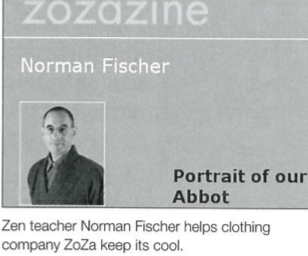
As advertised on their website, www.zoza.com, Mel and Patricia Ziegler, founders of the clothing retailer ZoZa as well as such successful companies as Banana Republic and Republic of Tea, have hired a genuine Zen teacher as a consultant: Norman Fischer, retired abbot of the San Francisco Zen Center. When they founded ZoZa in 1999, the Zieglers, longtime friends of Fischer and fellow Marin County residents, wanted the name “to reflect Zen values,” according to a ZoZa press release. They signed Fischer on to help them articulate this vision.
On a ZoZa web page titled “Portrait of Our Abbot,” Fischer offers this explanation: “It’s a revolutionary idea to have a spiritual person involved who understands the company, who is concerned about what is going on, who cares what happens – but who doesn’t make any promises that the bottom line will improve.” As for what a “Zen advisor” actually does, Fischer told Tricycle, “More or less nothing. I take an interest in what goes on and visit once in a while. Several times I have come in and given a little talk and discussion about Zen and work or calmness and ethics.”
Building Buddhism
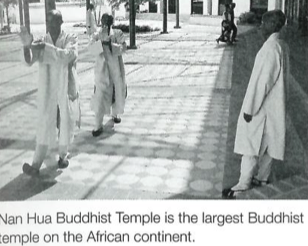
Construction on the first major Buddhist temple in Africa continues at an impressive rate. The final completion date for the Taiwanese Nan Hua Buddhist Temple and Monastery in Bronkhorstspruit, South Africa, is 2003, but the initial structures on the twenty-acre compound, including a museum, offices, and a temporary temple, have already been built. Funding for the project, which is projected to cost over $20 million, has come primarily through Zen Buddhist temples in Taiwan as well as from some of South Africa’s 14,000 resident Taiwanese immigrants. Organizers hope the temple will serve both as a monument to the success of the Taiwanese immigrant community in South Africa and as an inspiration for the spread of the dharma on the African continent. In an effort to attract monks, temple officials have begun placing paid advertisements in major papers across Africa announcing the construction of the temple and soliciting applications for monk candidates.
Meanwhile, controversy surrounds plans for two Buddhist centers in North America. According to a published report by the Pittsburgh Post-Gazette, the Zen Center of Pittsburgh, founded in March 1999 by Rev. Kyoki Roberts, has attracted the anger of neighbors and local officials. Several residents in the affluent Bell Acres area of Pittsburgh where the center has recently relocated have voiced concerns over anticipated traffic problems and crowds. Despite a conditional-use permit to operate the center, county officials told Roberts in December that she would only be able to hold services on Sundays, a restriction which is in apparent violation of the Religious Land Use and Institutionalized Persons Act, a federal statute enacted in 2000. Roberts, with the full support of the ACLU, subsequently filed suit and a judgment in her favor came down in early January of this year. Contacted by Tricycle, Roberts offered this interpretation of the controversy: “All this is is fear, and fear is something I understand. I understand when it comes up for me, and I understand when it comes up for others. Clearly, we still have some neighborly relationships to work on.”
And in Toronto, the Laotian community is mired in a costly legal battle with local residents who oppose their plans for a Buddhist temple. The Toronto Star reports that after a Laotian Buddhist group purchased a $400,000, seventy-three-acre farm in the wealthy Caledon district in order to construct a community temple, a group of fifty Caledon residents filed an appeal to prevent any groundbreaking. The Caledon residents argue that the proposed temple will be an eyesore incompatible with rural land use. The Laotian community, meanwhile, has had to redirect much of the money earmarked for construction of the temple to defray legal costs and to pay for environmental studies.
RITES OF SPRING
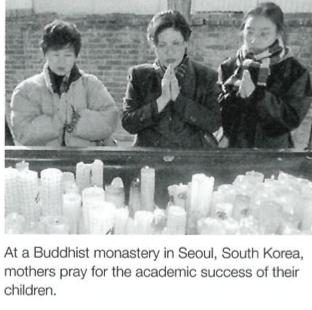
Once a year, thousands of South Korean parents flock to Bong Eun Temple outside of Seoul to pray for the enlightenment of their children. It is not satori, however, that they ask for, but a more mundane form of accomplishment. Competition for admission to South Korea’s top universities is fierce, and the country effectively shuts down during exam day, with flights suspended at Seoul’s airport. Buddhist monasteries are inundated at this time with parents who hope to tilt the odds in their children’s favor through prostrations and devotional practices. Some parents come for 100 consecutive days prior to exams. On the night before the exams, temples hold services that last long into the night for parents. “I’m just here trying to calm my own frayed nerves,” remarked one parent.
REAL TO REAL
In April 2001 the film series Real to Real: Buddhism and Film will take place at the Asian Art Auditorium in San Francisco. The series, co-sponsored by the San Francisco Zen Center and the Asian Art Museum, presents twelve films that, according to organizers, illuminate the “mutual inspirations of Buddhism on art and art on Buddhism.” The sponsors of Real to Real have chosen films set in Buddhist cultures, such as Mandala (1981) from South Korea, as well as American or European films that can be viewed through a Buddhist lens. Hollywood productions such as Groundhog Day and Fearless are included in the latter category. Each film will be introduced by a speaker; scheduled presenters include writers Gretel Ehrlich and Maxine Hong Kingston, actor/director Peter Coyote, Korean scholar Robert Buswell, and Buddhist teacher Reb Anderson. The complete list of films and speakers can be found on the website www.sfzc.com.
THE WHEEL
Players of The Tibet Game (free online at www.tibetgame.com/tibet) travel through panoramic views of Tibet, giving away photos of the Dalai Lama to strangers in a quest for good karma points and a shot at nirvana. Probably the first adventure game to offer cowpies in its virtual marketplace.
The Kubose Dharma Legacy in Skokie, Illinois, has a Buddhist answer to popular Christian dial-a-prayer services. Dial-the-Dharma was started twenty years ago by the late Rev. Gyomay Kubose, who founded the Buddhist Temple of Chicago in 1944. A recent message, “Dharma in the fast lane,” encourages students to practice with the same conviction that a runner gives to the start of a race. Dial (847) 677-8053 for a dharma talk anytime.
In a recent British Airways magazine advertisement, Shakyamuni Buddha is pictured looking uncomfortable and sad in an upright airline seat, but relaxed and smiling when the seat is reclined. Buddhists around the world were displeased with this odd and misleading representation and, after a series of complaints – most notably from science fiction writer and Sri Lanka resident Arthur C. Clarke – the airline decided to drop the ad.
The Convention of Southern Baptists, the largest group of Baptists in the U.S., has published a book for its members giving instruction on how to pray for the spiritual welfare of Buddhists. Previous books were aimed at Muslims, Jews, and Hindus. A section of their website is dedicated to “Interfaith Evangelism,” and their bulletin on Buddhism offers pointers for eager missionaries in a section called Bridges for Evangelizing Buddhists: “The gospel can be appealing to Buddhists if witnessing focuses on areas of personal need where the Buddhist belief system is weak. Some major areas include: Suffering, Meaningful Self, Future Hope, Moral Law, and Merit.”
Now you can make a fizzy toast to Tibet’s freedom with Free Tibet Golden Ginger Ale, a new brew from Boston’s famous Emack & Bolio’s. Produced in collaboration with the Tibetan Association of Boston, the drink will have the Tibetan national flag on the label, as well as the web address of the Tibetan government-in-exile.